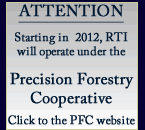|
The Rural Technology Initiative realizes the
importance of technology training as the surest way to empower
the small forest landowner with the forestry tools of today. To
continually improve the training workshops, participants are encouraged
to submit comments and suggestions. Below are some of those comments.
| David Jenner, small forest landowner: “I
want to thank you all for doing such a great job with the
(Landscape Management System) training.” |
| Chan Norenberg, former President Washington Farm
Forestry Association:“You people are doing
a great job; this is the technical leg-up that Washington’s
farm foresters desperately need.” |
| Sherry Fox, landowner and member of the Advisory
Board: “RTI provides nonindustrial forest landowners and tribes with the technical support to undertake
planning for certification, habitat conservation, carbon
sequestration, fires risk reduction and other important
strategies….you need only to look at their website
at www.ruraltech.org. Their achievements are impressive.” |
| Kathleen Hemenway, PhD, Wildlife Hazard Mitigation – Research: “I
read ‘Investigation of Alternative Strategies for Design,
Layout, and Administration of Fuel Removal Projects’ and
I think it is a wonderful analysis.” |
| James Walls: “Program Coordinator, Sustainable
Northwest: “I am currently working
in Oregon with the Nature Conservancy, a private landowner
and the Forest Service on projects utilizing LMS. We are
calculating carbon credits and applying other leading edge
technology utilizing LMS. The great thing about technology
like LMS is it’s free and available for downloading
off the Internet. Any forester in the United States can
download LMS and utilize it.” |
| Robert Wahpat, Chairman, Yakama Nation Tribal
Council: “The RTI …has worked closely
with the Yakama Nation Tribal and Bureau of Indian Affairs
forestry staffs. The Yakama Nation needs tools such as
RTI, combining the educational and technical support from
the best science at our universities, to assist in achieving
the balance of economic development and environmental protection
in our forests.” |
| Daniel Underwood, Peninsula College Professor: "RTI,
by making possible access to 'state of the art' forest science,
from models to computer simulation, has provided a much-needed
public good in rural communities. I attended the LMS training
session I was able to use LMS in class upon my return to
campus.” |
|








